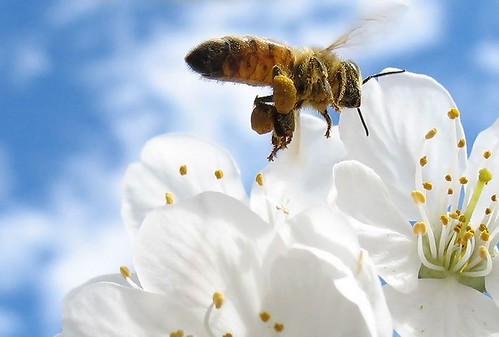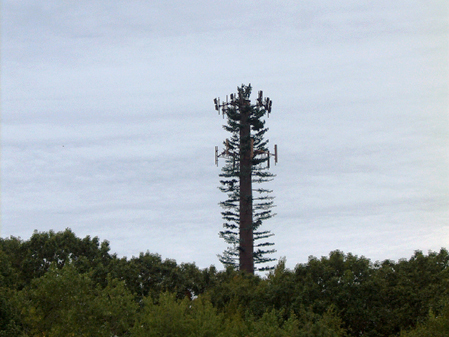buzz off
Across America and Europe, honeybee colonies are collapsing from an unknown cause. Some beekeepers in the eastern United States are reporting 70% loses in the past year. Bees are critical for the pollination of many crops including apples, almonds, and tomatoes. The widespread collapse of their hives has serious implications for the world's food supply.
 A honeybee laden with pollen. Photo by mommamia.
A honeybee laden with pollen. Photo by mommamia.
No one is sure of why the bees are vanishing, though there are many theories. Some believe that radiation from cell phones is to blame. Indeed, the industrialized nations suffering from Colony Collapse Disorder (CCD) are among those with the highest cell phone usage.
 Cell tower in Massachusetts. What are they trying to hide? Photo from Haynes.tv. More antenna camouflage here.
Cell tower in Massachusetts. What are they trying to hide? Photo from Haynes.tv. More antenna camouflage here.
The science behind cell phone radiation is questionable, however, and most apiarists think other factors are to blame. (In fact, the authors of one oft-cited study say their findings were misinterpreted and and they "cannot explain the CCD-phenomenon itself and want to keep from speculation in this case.")
 An 18-wheeler being loaded with beehives for transport. Photo from Wikipedia.
An 18-wheeler being loaded with beehives for transport. Photo from Wikipedia.
Some believe pesticides are to blame for the current rash of colony collapses. In a great article for OnEarth Magazine, Sharon Levy shadowed beekeeper Jeff Anderson as he travelled across the country with his colonies as a pollinator-for-hire. On his annual transcontinental migration, he rigorously avoided farms in areas where pesticides like Sevin and Penncap-M are used, even though many such chemicals are legal. If just one bee harvests pollen from plants sprayed with these compounds, the poison can spread through the whole hive.
 A healthy colony abuzz with workers, stored pollen, and eggs. Photo by Dan Winters.
A healthy colony abuzz with workers, stored pollen, and eggs. Photo by Dan Winters.
Others believe that some form of parasite is to blame. Varroa mites, first discovered in the US in 1987, have reduced bee populations but they aren't thought to play a large role in the current collapses. Instead, researchers are focusing on bacterial, viral and fungal infections. In some cases, however, so many pathogens are found in the dead bees of collapsed colonies that it suggests the infections are a symptom of weakened defenses, and not a cause.
 Bee-made vase by Tomas Gabzdil Libertiny of Studio Libertiny. Via Inhabitat.
Bee-made vase by Tomas Gabzdil Libertiny of Studio Libertiny. Via Inhabitat.
In his journal, David Byrne, asks: "[could] GM agribusiness could be trying to eliminate bees"? Whether there's a conspiracy against the bees or not, a German study found that one variety of genetically modified corn with DNA from bacteria may have "altered the surface of the bee's intestines, sufficiently weakening the bees to allow the parasites to gain entry." At the same time, the director of the study admits, "perhaps it was the other way around. We don't know."
 The Ancient Beekeeping Museum, Stripeikiai, Lithuania. Photo via Wikipedia.
The Ancient Beekeeping Museum, Stripeikiai, Lithuania. Photo via Wikipedia.
Perhaps there is no one reason the bees are disappearing. Maybe we've reached a critical tipping point in the fragile symbiosis of plant, bee, and human. For millennia, beekeepers have worked at the intersection of the built and natural environments. As humans explore new ways to manipulate that boundary with techniques like industrial farming and GM crops, we may be upsetting the balance. As a society finally acknowledging our role in global warming, we know that we can no longer protect nature passively: we must actively manage the relationship between the built and natural environments.
 A honeybee laden with pollen. Photo by mommamia.
A honeybee laden with pollen. Photo by mommamia.No one is sure of why the bees are vanishing, though there are many theories. Some believe that radiation from cell phones is to blame. Indeed, the industrialized nations suffering from Colony Collapse Disorder (CCD) are among those with the highest cell phone usage.
 Cell tower in Massachusetts. What are they trying to hide? Photo from Haynes.tv. More antenna camouflage here.
Cell tower in Massachusetts. What are they trying to hide? Photo from Haynes.tv. More antenna camouflage here.The science behind cell phone radiation is questionable, however, and most apiarists think other factors are to blame. (In fact, the authors of one oft-cited study say their findings were misinterpreted and and they "cannot explain the CCD-phenomenon itself and want to keep from speculation in this case.")
 An 18-wheeler being loaded with beehives for transport. Photo from Wikipedia.
An 18-wheeler being loaded with beehives for transport. Photo from Wikipedia.Some believe pesticides are to blame for the current rash of colony collapses. In a great article for OnEarth Magazine, Sharon Levy shadowed beekeeper Jeff Anderson as he travelled across the country with his colonies as a pollinator-for-hire. On his annual transcontinental migration, he rigorously avoided farms in areas where pesticides like Sevin and Penncap-M are used, even though many such chemicals are legal. If just one bee harvests pollen from plants sprayed with these compounds, the poison can spread through the whole hive.
 A healthy colony abuzz with workers, stored pollen, and eggs. Photo by Dan Winters.
A healthy colony abuzz with workers, stored pollen, and eggs. Photo by Dan Winters.Others believe that some form of parasite is to blame. Varroa mites, first discovered in the US in 1987, have reduced bee populations but they aren't thought to play a large role in the current collapses. Instead, researchers are focusing on bacterial, viral and fungal infections. In some cases, however, so many pathogens are found in the dead bees of collapsed colonies that it suggests the infections are a symptom of weakened defenses, and not a cause.
 Bee-made vase by Tomas Gabzdil Libertiny of Studio Libertiny. Via Inhabitat.
Bee-made vase by Tomas Gabzdil Libertiny of Studio Libertiny. Via Inhabitat.In his journal, David Byrne, asks: "[could] GM agribusiness could be trying to eliminate bees"? Whether there's a conspiracy against the bees or not, a German study found that one variety of genetically modified corn with DNA from bacteria may have "altered the surface of the bee's intestines, sufficiently weakening the bees to allow the parasites to gain entry." At the same time, the director of the study admits, "perhaps it was the other way around. We don't know."
 The Ancient Beekeeping Museum, Stripeikiai, Lithuania. Photo via Wikipedia.
The Ancient Beekeeping Museum, Stripeikiai, Lithuania. Photo via Wikipedia.Perhaps there is no one reason the bees are disappearing. Maybe we've reached a critical tipping point in the fragile symbiosis of plant, bee, and human. For millennia, beekeepers have worked at the intersection of the built and natural environments. As humans explore new ways to manipulate that boundary with techniques like industrial farming and GM crops, we may be upsetting the balance. As a society finally acknowledging our role in global warming, we know that we can no longer protect nature passively: we must actively manage the relationship between the built and natural environments.

12 comments:
Apparently organically raised bees aren't disappearing the same way as commercial bees that suffer the pressures of artificial feeding, antibiotics, insecticides in the hive, etc. My own bet's on GM, though.
Hi,
I love the bee museum. I might try my hand at bee-keeping if it leads to the regeneration of the declining population. Love the vases, too.
Regards,
Coral
I hate those fake trees! There is one as you drive north on the parkway as well.
hey wow, that's fascinating.. thankyou for the thought provoking blog! really interesting photos, too.
You take wonderful pictures :)
Wow! That bee-vase is amazing! I'd fill it with wine!
Love the pics especially the one at the top!
HOLA!!!
wasup ??
just saw ur blog find it really kool,it really rocks man hey i've got this really kool!! kinda website check out the link below
http://www.bigadda.com/Boss/quiz.php?type=web&uid=98
it rockzzz.....
cheerrzzz..!!!!
please read my fictional blog journal
facialanomaly.blogspot.com
that was really cool im a big tree hugger and i personally think its the cell phones wut about u?
Scary...
"If the bee disappears from the surface of the earth, man would have no more than four years to live. No more bees, no more pollination, no more plants, no more animals, no more man."
Good and Informative Blog. If this is due to radiations from cell phones, then probably asia is also going to suffer soon, as number of cell phone users in the remote areas (where generally Bee farming happens) is growing.
Pesticides probably may not be a reason, because the pesticides used in asian countried (India to be more specific) are more harmful (almost nothing is banned here).
I hope that something can be done to save the Bees.
Kunal Singh
My Blog
Post a Comment